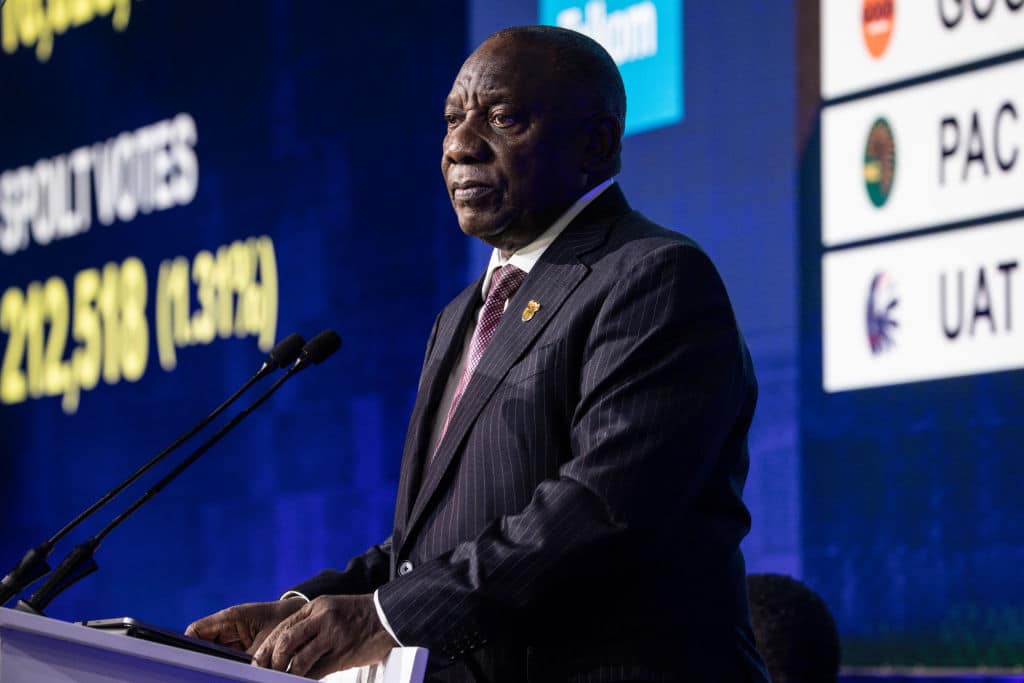The country’s National and Provincial Elections marked a significant shift in the political landscape, this as the African National Congress (ANC) lost its parliamentary majority for the first time, along with the rapid rise of the uMkhonto weSizwe (MK) Party, among others.
The 2024 elections in South Africa have been described by some as the most hotly-contested since the end of apartheid in 1994. The results have ushered in a new era of coalition politics, challenging the dominance of the African National Congress (ANC) and highlighting the rapid emergence of the uMkhonto weSizwe (MK) Party.
For the first time in 30 years, the ANC has lost its parliamentary majority, securing only 40.18% of the National Assembly vote and the most of the 400 available seats. This represents a significant drop from its previous standing, necessitating coalition talks with parties such as Democratic Alliance (DA) and Economic Freedom Fighters (EFF), to form a stable government.
The rise of the MK Party, led by former president Jacob Zuma, has been a remarkable development in South African politics.
Gustavo de Carvalho, a Senior Researcher on African governance and diplomacy at the South African Institute of International Affairs (SAIIA), explains to FORBES AFRICA that “the rise of the MK Party as the third-largest political party in South Africa is largely reflective of the internal conflicts and factional behaviors within the ANC over the past 15 years”.
Loading...
“This development is significant as it creates a major split for the ANC in KwaZulu-Natal (KZN) and requires the party to rethink how to reach out to those bases,” he adds.
The MK Party secured 14.58% of the national vote and has become the largest party in KZN, although it fell short of an outright majority in the province. This shift underscores the fragmentation of the traditional ANC electorate.
The MK Party’s success has largely come at the expense of the ANC and EFF, both of which have seen a significant decline in support.
There have been concerns about potential unrest in KZN, particularly due to Zuma’s comments challenging the election results and alleged vote rigging. The authorities are closely watching the situation to prevent any escalation of violence and to maintain peace as the political landscape continues to shift.
Voter turnout was another critical aspect of this election, with a participation rate of 58.64%, down from 66% in the previous elections.
“The lower turnout is due to several issues. Many still feel disenchanted with the options provided to them and are reluctant to vote for any party. This is a similar declining trend we have seen in South Africa for at least ten years,” De Carvalho notes.
The IEC (Independent Electoral Commission) reported handling 579 objections and 24 recounts, none of which were significant enough to alter the election outcome. Despite the objections and accusations of vote-rigging from some quarters, the IEC maintained that the elections were free and fair.
“The IEC’s handling of the election has been commendable despite minor glitches,” says de Carvalho.
“Their emphasis on accuracy and speed, even with the additional ballot, demonstrates their commitment to maintaining the integrity of the elections. This should positively impact public trust in the electoral process.”
The election has set the stage for a period of coalition governance, with significant challenges and opportunities ahead.
De Carvalho highlights the complexity of forming these coalitions, noting, “Parties will consider how these coalitions will impact their ideological stances, particularly identifying views of the ANC that may oppose their own. The DA and the IFP (Inkatha Freedom Party) seem to be more pragmatic than ideological in their approaches, while the MK has specific demands related to the Ramaphosa-Zuma battle.”
Coalition talks are currently underway, with the ANC engaging in discussions with both the EFF and DA.
The provincial results further underscore the shift in South Africa’s political landscape. In Gauteng, the ANC lost its majority, securing only 36.48% of the vote, followed by the DA with 26.63% and the EFF with 12.47%.
In KZN, the MK Party emerged as the largest party with 45.93% of the vote, followed by the ANC with 17.62% and the IFP with 16.28%.
“I grew up loving the ANC because of how they fought for the freedom we have today,” says Skhumbuzo Mnyandu, a business owner from KwaMashu.
“But this year, I have changed because of the problems with the ruling party, and so I have become a member of the MK Party.”
The Western Cape remains under the control of the DA, which secured 53.05% of the vote, while the ANC garnered 21.34%. The Northern Cape is also set for coalition politics, with the ANC losing its outright majority in the province.
President Cyril Ramaphosa, in his address at the IEC Election Results Announcement, called for unity and cooperation, stating, “The people of South Africa expect their leaders to work together to meet their needs. They expect the parties for which they have voted to find common ground, to overcome their differences, to act and work together for the good of everyone.”
The final seat allocations in the National Assembly reflect the new political reality: the ANC holds 159 seats, the DA 87, the MK Party 58, and the EFF 39. Other parties like the IFP, the Patriotic Alliance (PA), and the Freedom Front Plus (VF Plus) have also secured notable representation.
As South Africa navigates this new political landscape, the emphasis remains on working together for the good of the country. The 2024 elections have not only redefined the political dynamics, with the future of the country now hinging on the ability of its leaders to navigate these changes and build a government that truly reflects the will of the people.
Loading...
